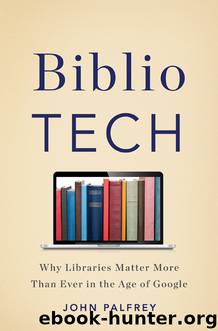BiblioTech by John Palfrey

Author:John Palfrey [Palfrey, John]
Language: eng
Format: epub
ISBN: 9780465040605
Publisher: Basic Books
THE SKILLS THAT librarians need to develop, in order to operate at scale, look a lot like the skills that Google, Amazon, Mozilla, Khan Academy, and Wikipedia staff members develop through their day-to-day work. Creating these newly curated sites involves simple forms of computer programming, such as scripting. It calls for a design sensibility, both in approaching a known problem and in presenting information in a compelling way. New forms of metadata—data about the data—must be developed to help people find the most relevant information; librarians are awfully good at this already, but often don’t practice this skill on the open web. What libraries risk in failing to adapt the skills of librarians is obsolescence.
Co-producing curated materials and metadata serves more than simply professional development purposes. One of the essential functions of presenting information at scale over the network is creating enough data about the materials to enable search algorithms to guide users to the most relevant materials. For instance, Google’s PageRank algorithm, though secret in its particulars, is widely known to call upon the page rank of web pages that link to any given web page, as well as the search history of an individual, in order to render useful results. As large amounts of library materials come online, a huge need is arising for high-quality metadata to ensure that search algorithms return the best results first and less relevant results later.
Certain search problems cannot be solved without a co-production approach. Consider the problem of adding fine-grained location information to the records of digital materials. If someone is looking for images that relate to Shanghai, for instance, the knowledge that a digitized photograph comes from China is not as useful as knowing that the photograph comes from the city of Shanghai—or better yet, a particular neighborhood within Shanghai. To know that the photograph comes from the twentieth century is not as useful as knowing that the photograph was taken in the year 1949. The task of creating these data about digitized images is often straightforward, but it is a task that needs to be organized and carried out in a systematic fashion.
The function of adding good metadata about geographic location and data to an image file in a format that a search engine can understand might be performed by any number of people. The training of professional librarians would equip them well for this task, but there are a limited number of professional librarians and there is an endless amount of material that needs to have metadata added to it. While some high-value materials ought to be handled by professional librarians, the vast majority of materials in a national or international database might be managed by less well trained people. These volunteers might include a part-time worker at a small-town historical society or a resident of the relevant town. By coordinating a process that would allow interested individuals to help with metadata creation and updating, rather than doing all the work themselves, professional librarians could add vastly more to the digital commons.
Download
This site does not store any files on its server. We only index and link to content provided by other sites. Please contact the content providers to delete copyright contents if any and email us, we'll remove relevant links or contents immediately.
Cecilia; Or, Memoirs of an Heiress — Volume 1 by Fanny Burney(31366)
Cecilia; Or, Memoirs of an Heiress — Volume 3 by Fanny Burney(30962)
Cecilia; Or, Memoirs of an Heiress — Volume 2 by Fanny Burney(30918)
The Great Music City by Andrea Baker(22065)
We're Going to Need More Wine by Gabrielle Union(18100)
Bombshells: Glamour Girls of a Lifetime by Sullivan Steve(13132)
Pimp by Iceberg Slim(12965)
All the Missing Girls by Megan Miranda(12798)
Fifty Shades Freed by E L James(12474)
Talking to Strangers by Malcolm Gladwell(11935)
Norse Mythology by Gaiman Neil(11932)
Crazy Rich Asians by Kevin Kwan(8386)
Mindhunter: Inside the FBI's Elite Serial Crime Unit by John E. Douglas & Mark Olshaker(7870)
The Lost Art of Listening by Michael P. Nichols(6502)
Enlightenment Now: The Case for Reason, Science, Humanism, and Progress by Steven Pinker(6430)
Bad Blood by John Carreyrou(5798)
The Four Agreements by Don Miguel Ruiz(5547)
Weapons of Math Destruction by Cathy O'Neil(5068)
We Need to Talk by Celeste Headlee(4898)
